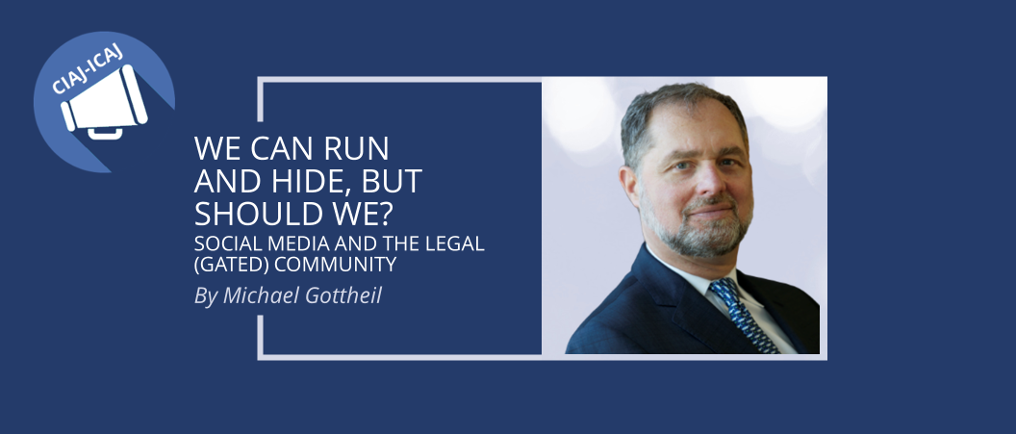We Can Run and Hide, But Should We?

Social Media and the Legal (Gated) Community
As lawyers, judges, adjudicators and legal academics, we are privileged. We work within a domain that has a proud tradition of advancing equity, justice, fairness and rights. We are also privileged in another way. We are trained in jurisdictional analysis. We are able to, indeed, feel compelled whenever we are confronted with a difficult issue, to first ask, “do I have the authority, the power, or the responsibility to consider this request?” I say it is a privilege because through our legal training and mastery of the reasoning process, we are able to justify inaction, even in the most compelling of circumstances. We wear this stoic dispassion like a righteous badge of honour.
As judges and adjudicators, we also live behind walls constructed to protect our independence and preserve the appearance of our neutrality. Legal principles and institutions exist to ensure nothing will affect our actions, unless filtered through specific frameworks designed to provide legitimacy to our determinations of truth, and our decisions. These are like gates we open and close to prevent us from seeing or hearing things that might subject us to “undue” influence.
At the same time, as human beings, with innate compassion and empathy, we are obviously not immune from the connectivity that comes with the proliferation of social media, email and the internet. Conversations have opened up about the appropriate ways we should engage with these digital communication platforms. We are having discussions about whether or how the Courts and Tribunals should use technology to communicate their activities, from streaming trials to posting records, and even about whether judges should be able to tweet and blog.
But what about the other side of the coin? What about the voices we now can hear, indeed may not be able to so easily ignore? Are these opportunities which might enrich our work, or just more challenges to our independence? Should we be reflecting on ways to use the new accessibility of diverse voices to deepen our perspectives and even our humanity?
I recently received an email from someone I did not know. The subject line was “please, I want to live. I am a human being.” The message read:
My name is Mohammed [S], I am married and I have a little girl. I am Syria, we are from Idlib. We ask for help from Canada. We die here in Turkey.
As Chief of the Alberta Human Rights Commission, I receive many emails from people looking for help. Generally I can refer the inquiry to someone, and simply delete the email. Sometimes it will be from someone railing against a Tribunal decision or a news story, accusing me of being a Mafia Don, or worse. I usually just delete the email.
But this email was different. I don’t know Mohammed S. All I know is that I received an email from someone who says he is a human being, who is suffering greatly, and is asking the head of a human rights organization for some level of justice. I have no one to refer Mohammed S for help. But I cannot delete the email. It sits there in my inbox.
Why this story? Because I have to admit that I did wonder whether the email came from a bot, or a troll. I wondered whether, if I received another email from Mohammed S, I would block his IP address, or flag it a junk. Or maybe get in touch with government IT security to add Mohammed S and his family to a “block sender list.”
I have decided not to take advantage of all the options my position provides, indeed would justify. I will instead assume Mohammed S is, as he claims, a real human being, and I will leave his email in my inbox as a reminder, from time to time, of how I am privileged to live in a legal gated community.

